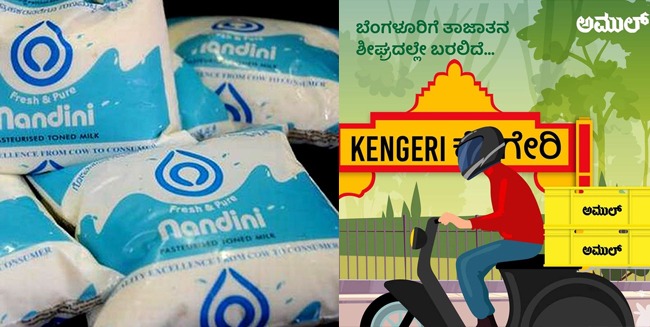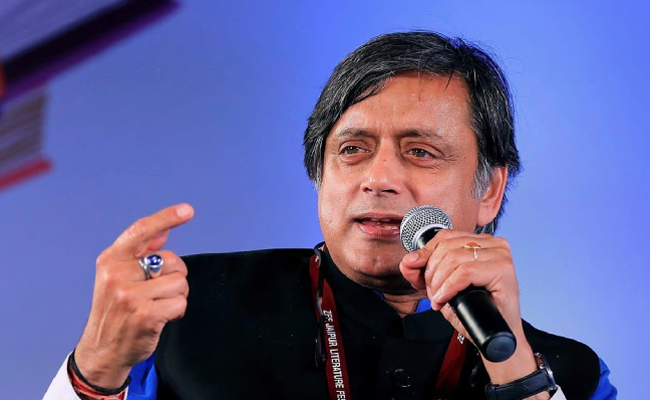New Delhi(PTI): Caught in the political row over market place battle with popular Karnataka brand Nandini, head of the Gujarat-based cooperative selling Amul brand on Tuesday said it will sell milk and curd only through online channels in Bengaluru and there is no competition with Nandini milk which is much cheaper due to the state government subsidy.
Gujarat Co-operative Milk Marketing Federation (GCMMF) MD Jayen Mehta asserted that there cannot be "Amul versus Nandini" scenario as both are co-operatives owned by farmers. GCMMF will sell its Amul products only through e-commerce platforms and there is absolutely no plan of full-fledge entry into Karnataka, he told PTI.
According to him, Amul has been selling fresh milk in two districts of north Karnataka since 2015-16, but "there is no competition" as Karnataka Milk Federation's (KMF) Nandini milk is much cheaper than Amul because of the subsidy being provided by the state government.
Amul milk is Rs 54 per litre while Nandini milk is Rs 39 per litre only as the state government provides subsidy to farmers, he added.
A political row has erupted after Amul's announcement on April 5 that it will supply milk and curd in Bengaluru. Opposition parties -- Congress and the JD(S) -- have trained their guns at the ruling BJP in the state when the assembly elections are just a month away, expressing fears that the Rs 21,000 crore-Nandini brand, could be merged with Amul.
"There is no question of merger. Both are cooperatives. Amul is owned by farmers of Gujarat and Nandini is owned by farmers of Karnataka. Both of us have been working together not from now but since decades to build India's cooperative dairy industry. This has made India the largest producer of milk in the world," Mehta said.
Mehta, who is currently the MD in charge of GCMMF, emphasised that "there is no threat to Nandini from Amul and vice-versa. Both the co-operatives are working in co-ordination and co-operation with each other".
About the launch of its products in Karnataka, Mehta said the co-operative has been selling fresh milk in Huballi and Dharwad in North Karnataka from 2015-16, although its volume is only 8,000-10,000 litres per day as against around 1.30 lakh litres of milk per day is sold by Nandini in these two districts.
"People are saying that Amul has entered in Karnataka. But we are there from 2015-16 itself," he said, adding that the recent launch of Amul Taaza (toned milk) in Bengaluru is only and only through e-commerce platforms based on customers search data on online platforms.
He also ruled out plans for full-fledge entry into the Southern state as it is "not possible" because of the big price disadvantage.
GCMMF does not have milk processing plants and other infrastructure in Karnataka.
Citing example about the association between the two co-operatives, he said even today Amul ice cream is getting manufactured from Nandini milk and packed in their plants. This association for ice-cream has been in place since 1998.
During 2020-21, when the country was grappling with the coronavirus pandemic,
Mehta said GCMMF had purchased Rs 200 crore worth cheddar cheese from Nandini to support the farmers of Karnataka in view of surplus milk production at that time.
"We also co-operate in many other ways, like giving technical supports," he said.
GCMMF is expecting a 20 per cent growth in its revenue this fiscal to around Rs 66,000 crore on rising demand. It registered a turnover of Rs 55,055 crore in 2022-23, up 18.5 per cent from the previous year.
At present, GCMMF has 98 milk processing plants across the country with an installed capacity of 470 lakh litres per day. On an average, it is collecting 270 lakh litres of milk everyday from farmers.
Let the Truth be known. If you read VB and like VB, please be a VB Supporter and Help us deliver the Truth to one and all.
New Delhi (PTI): Congress leader Shashi Tharoor on Saturday, while lauding the win of the UDF in Kerala local bodies elections, also congratulated the BJP for its historic performance in his Thiruvananthapuram constituency, calling it the "beauty of democracy".
In a post on X, he said the people's verdict must be respected, whether for the UDF overall or for the BJP in his constituency.
"What a day of amazing results in the Kerala local self-government elections! The mandate is clear, and the democratic spirit of the state shines through.
"A huge congratulations to @UDFKerala for a truly impressive win across various local bodies! This is a massive endorsement and a powerful signal ahead of the state legislative elections. Hard work, a strong message and anti-incumbency have all clearly paid off to achieve a much better result than in 2020," Tharoor said.
He said he also acknowledges the historic performance of the BJP in Thiruvananthapuram, and "offer humble congratulations on their significant victory in the city corporation - a strong showing that marks a notable shift in the capital's political landscape."
Tharoor said he campaigned for a change from 45 years of the LDF "misrule", but the voters have ultimately rewarded another party that also sought a clear change in governance.
"That is the beauty of democracy. The people's verdict must be respected, whether for the UDF overall or for the BJP in my constituency.
"We will continue to work for the betterment of Kerala, advocating for the people's needs and upholding the principles of good governance. Onwards and upwards!" Tharoor, who is the MP from Thiruvananthapuram, said.
The lotus bloomed in the state capital as the BJP-led NDA achieved a resounding win in the polls for the Thiruvananthapuram Corporation, snatching it from the CPI(M)-led LDF and marking an end to 45 years of continuous Left rule in the local body.
The win in the Thiruvananthapuram Corporation will act as a boost for the BJP in the 2026 Assembly polls, especially in the state capital.
Of the 101 wards in the Thiruvananthapuram Corporation, the BJP won 50, LDF 29, UDF 19 and two wards were won by independent candidates.
The BJP is one seat short of a decisive majority in the corporation.
Besides this, the NDA retained the Palakkad municipality after a close battle with the Congress-led UDF and wrested the Thrippunithura Municipality from the grand old party.
In Thrissur, from where Suresh Gopi won in the Lok Sabha polls last year, the BJP won 18 out of the 46 wards in Kodungallur Municipality, eight in Thrissur Corporation, two each in Guruvayoor and Vadakkancherry municipalities, seven in Kunnamkulam Municipality, six in Irinjalakuda Municipality and one in Chalakudy Municipality.





